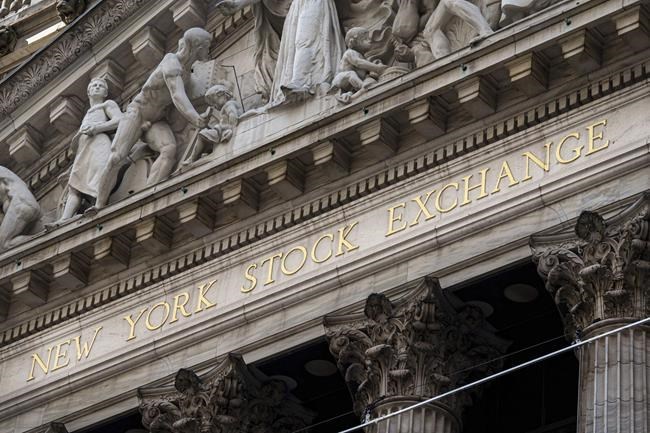NEW YORK (AP) — Wall Street closed out its worst week in a month with more losses. The S&P 500 fell 1.3% Friday. The Dow lost 286 points, and the Nasdaq composite dropped 1.5%. The stock market has been under pressure from the bond market, where the yield on the 10-year Treasury briefly touched 5% Thursday evening for the first time since 2007. High yields make borrowing more expensive for everyone, and they slow the economy while dragging on investment prices. The 10-year yield eased Friday, but only after hanging near 4.99% in the morning. Crude oil prices fluctuated, and gold’s price rose.
THIS IS A BREAKING NEWS UPDATE. AP’s earlier story follows below.
NEW YORK (AP) — Wall Street is closing out its worst week in a month with more losses on Friday.
The S&P 500 was 0.9% lower in late trading and on track for a fourth straight drop. The Dow Jones Industrial Average was down 188 points, or 0.6%, as of 3 p.m. Eastern time, and the Nasdaq composite was 1.1% lower.
The stock market has been struggling under the weight of the bond market, where the yield on the 10-year Treasury briefly topped 5% late Thursday for the first time since 2007, according to Tradeweb. High yields make borrowing more expensive for everyone, and they slow the economy while dragging on prices for stocks and other investments.
The yield on the 10-year Treasury was sitting at 4.91% after easing from within a hair of 5% earlier in the morning. It’s been catching up to the Federal Reserve’s main interest rate, which is already above 5.25% and at its highest level since 2001.
Yields swung a day earlier after investors took comments from Federal Reserve Chair Jerome Powell to indicate the central bank won’t raise its main interest rate at the end of the month. But financial markets are less sure about what the Fed will do after that, and the central bank has said its upcoming moves will depend entirely on how inflation and the job market behave.
The Fed has raised its overnight interest rate at a furious pace in hopes of suffocating high inflation, which has come down from its peak last summer. But a rise in oil prices is threatening to add more upward pressure. Crude prices remained volatile amid worries about war in the Middle East.
A barrel of benchmark U.S. oil fell 62 cents to settle at $88.75. It’s been bouncing around since the latest Hamas-Israel war began, after leaping from $70 to more than $93 through the summer. Brent crude, the international standard, slipped 22 cents to $92.16 per barrel.
Gold's price climbed as investors herded into investments considered safer ahead of a weekend of uncertainty. It rose $13.90 to settle at $1,994.40 per ounce. Last week, it jumped more than 3% heading into the weekend.
Investors are pulling so many dollars out of riskier investments, such as junk bonds and global stock funds, and holding so much cash to protect themselves that a market-sentiment reading by Bank of America is signaling “extreme bearish.” Such a reading has historically been a signal for contrarians to buy, with stock prices typically improving in the ensuing three months, strategist Michael Hartnett wrote in a BofA Global Research report.
But he also noted it hasn't been a reliable signal when very big shocks occur, such as the period around Lehman Brothers' collapse in 2008 or the Russia-Ukraine war early last year. Maybe a jump for oil prices above $100 or the 10-year Treasury yield shooting above 5% could act as similar very big shocks this time around.
On Wall Street, SolarEdge tumbled 27% after the solar technology company slashed its sales and profit expectations for the current quarter. The company blamed order cancellations in Europe due in part to slower-than-expected installation rates.
Other solar stocks also fell, including a 14.3% drop for Enphase Energy.
Regions Financial sank 12.7% after it reported weaker profit than expected for the latest quarter. Focus has been on the banking industry outside its biggest titans. It was under heavy pressure earlier this year after high interest rates helped cause three high-profile collapses of U.S. banks.
Other regional banks were also weaker. Comerica fell 8% despite reporting better profit for the summer than expected. Huntington Bancshares sank 3.5% after likewise topping earnings forecasts.
SLB, the giant oilfield services provider, fell 2.2% despite reporting stronger profit than expected for the summer. Its revenue fell just shy of analysts’ expectations.
On the winning side of Wall Street was Knight-Swift Transportation. The trucking company jumped 10.8% after reporting stronger profit for the latest quarter than expected.
In stock markets abroad, indexes slumped across Europe and Asia.
___
AP Business Writers Zimo Zhong and Matt Ott contributed.
Stan Choe, The Associated Press



